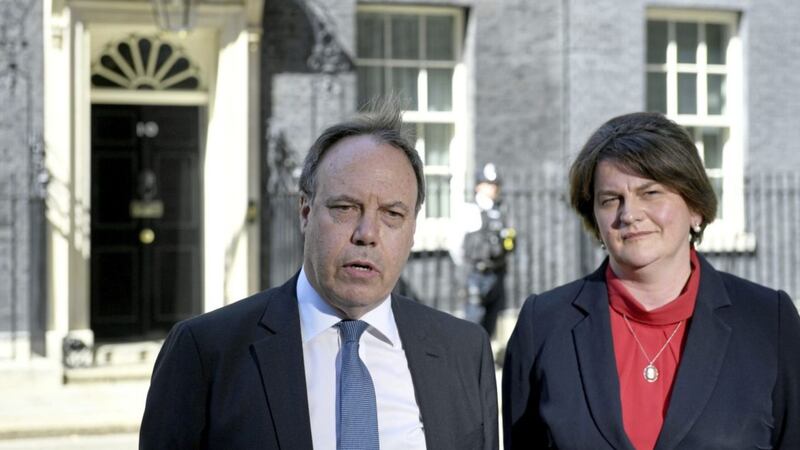Who said this? Clearly someone in a position of leadership: ‘I’m meeting with people from the Chief Constable to business and the message coming through is that nobody is in charge of anything.’
But this was Nigel Dodds in a BBCNI interview last Friday, and Nigel does not hold the title of DUP leader. The lack of leadership he deplores, in the matter of the Brexit shambles, is that of Theresa May with whom his party has an arrangement of which they constantly boast.
In formal terms, Nigel is DUP deputy leader. Ever since the deal with May he clearly leads the party in reality, or at least fronts it up. As at a microphone outside Number Ten last week, while his notional leader stood mutely beside him.
Arlene Foster has no remaining role. She may as well go on careering around people the party has maligned, offering her ‘hand of friendship’ as Dodds called it with trademark chippiness at being asked to define her behaviour. Policy-making or purely personal? Dodds’ own contribution in response was apparent reluctance to voice the term LGBT. The chippiness had begun when he was asked should Foster’s much vaunted reach-out not have included an apology, for the ugly things DUP representatives have said down the years about gay people and homosexuality in general.
No; Foster had shown responsibility, and people had said very nasty things about her. Attack the critics; classic DUP gambit. But the party is in a new place, in need of a rethink and badly in need of new leadership.
The twist is that the position of leader is now effectively held by Dodds, a politician who likes to sound dominant but is known for his determination not to take the top job. In that same interview he reiterated the party’s boastful ‘We talk to government all the time’ with customary add-on truculence, a performance for the domestic audience. DUP voters, the message goes, fear not, we will not be taken for granted as Ulster Unionists in Westminster were so often. If the British–Irish Intergovernmental Conference (BIIGC) interfered in ‘internal matters for Northern Ireland there will be consequences.’
The May cabal of the time negotiated their deal with little reference to the wider party. Strikingly, at this chaotic moment, the DUP has no soft word for the bedraggled politician who is ‘their’ prime minister and prized if captive ally.
In today’s continuing meltdown perhaps it would be odd if Dodds failed to distance the DUP from Theresa. Dislikeable, all the same; cold-blooded.
What matters is the pay-off for those ten votes. The clearest delivery to date - of the goodies the party so often crows about - is the £6.3m salary bill for a shuttered Stormont. Karen Bradley made a coy no comment last week when Sylvia Hermon wanted to know whose objections/persuasion had preserved those unearned wages. It would be amazing and surely irredeemably damaging if it was Sinn Féin.
This has been an empty year for northern party politics, a wasteland. Sinn Féin ticks along on its southern momentum. As the largest party the DUP might have expected to survive in better shape, but the slog through uncharted territory began, after all, with their leader losing her prized first minister post and with it what existed of her authority.
The RHI inquiry is the harshest stretch of that wasteland, unpredictable in advance, conclusions prematurely talked down by some. The hearings have exposed greedy, cynical business, almost laughably inefficient civil servants, and the workings of the party that dominated the power-sharing executive, in reality sharing only patronage and mainly concerned to maximise financial gain. The inquiry to date has stripped bare party structures apparently dominated by unelected advisers not a fraction as smart as they and presumably their ministers imagined.
Foster’s ‘reach-out’ distracted attention from testimony before the summer break about alleged effort by some Spads to foist blame on a DUP minister, Jonathan Bell. He and Foster are scheduled to attend the inquiry in September. It was of course Bell’s appearance as a whistleblower that triggered the Martin McGuinness ultimatum, which Foster rejected, which ...for want of a nail, and so on.
Arlene lingers in a discarded toast-rack because the party lacks an alternative. Nigel ought to be the chap who leads the grey suits to the leader and says time to go. Instead he has summoned up all his damped-down bumptiousness to trumpet the party’s significance at Westminster. It would all look more pathetic if Westminster was functional.








